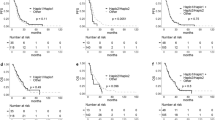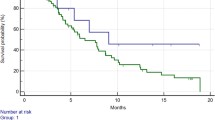Abstract
Purpose
The aim of this study is to evaluate the influence of germline vascular endothelial growth factor (VEGF) gene polymorphisms (VGPs) on the efficacy of the anti-VEGF antibody bevacizumab (Bev) in metastatic colorectal cancer (MCRC) patients.
Methods
Forty MCRC patients eligible for a first-line therapy were enrolled in this prospective trial and treated with FOLinate/Fluorouracil/Irinotecan (FOLFIRI) + Bev (male/female = 22:18, age (median) = 61 years). Eight VGPs within the promoter/5’UTR region were evaluated in patient blood samples. Primary endpoint was association between VGPs and median progression-free survival (mPFS). Overall radiological response rate (ORR), overall survival (OS), and toxicity were assessed as secondary outcomes.
Results
VGPs −2578, −1512, −1451, −1411, and −460 were in complete linkage disequilibrium and therefore analyzed as haplotype (two variants: Haplo1: A-18 bp insertion-T-4G-C and Haplo2: C-18 bp deletion-C-5G-T, respectively). Seventeen patients Haplo2/Haplo2 had significantly shorter mPFS compared to 23 patients Haplo1/Haplo1 or Haplo1/Haplo2 (mPFS, 9 vs. 15.4 months, respectively, p = 0.02; hazard ratio (HR), 2.64). Also, VGPs −152 (G/G vs. G/A + A/A) and −1154 (G/G vs. G/A + A/A) were significantly associated with PFS (mPFS, 8.9 vs. 15.4 months, p = 0.007; HR, 3.53 and 9.8 vs. 16 months, p = 0.03, HR, 2.32, respectively). In the multivariate analysis including also biochemical variables known to influence prognosis, VGP −1154 retained an independent predictive value for mPFS (G/G over G/A + A/A = HR, 4.43; p = 0.02). With regard to ORR, only VGP −634 was significantly associated with response (G/G vs. G/C + C/C = 64% vs. 14%, p = 0.03). No significant influence on OS and toxicity by the investigated VGPs was observed.
Conclusions
Although these data need to be confirmed in larger trials, investigation of germline VGPs may help identify patients who are more sensitive to anti-VEGF agents.

Similar content being viewed by others
References
Jemal A, Siegel R, Ward E, Hao Y, Xu J, Thun MJ (2009) Cancer statistics, 2009. CA Cancer J Clin 59:225–249
Köhne CH, Lenz HJ (2009) Chemotherapy with targeted agents for the treatment of metastatic colorectal cancer. Oncologist 14:478–488
Heath VL, Bicknell R (2009) Anticancer strategies involving the vasculature. Nat Rev Clin Oncol 6:395–404
Karapetis CS, Khambata-Ford S, Jonker DJ, O'Callaghan CJ, Tu D, Tebbutt NC et al (2008) K-ras mutations and benefit from cetuximab in advanced colorectal cancer. N Engl J Med 359:1757–1765
Loupakis F, Pollina L, Stasi I, Ruzzo A, Scartozzi M, Santini D et al (2009) PTEN expression and KRAS mutations on primary tumors and metastases in the prediction of benefit from cetuximab plus irinotecan for patients with metastatic colorectal cancer. J Clin Oncol 27:2622–2629
Ince WL, Jubb AM, Holden SN, Holmgren EB, Tobin P, Sridhar M et al (2005) Association of k-ras, b-raf, and p53 status with the treatment effect of bevacizumab. J Natl Cancer Inst 97:981–989
Stockmann C, Doedens A, Weidemann A, Zhang N, Takeda N, Greenberg JI et al (2008) Deletion of vascular endothelial growth factor in myeloid cells accelerates tumorigenesis. Nature 456:814–818
Stevens A, Soden J, Brenchley PE, Ralph S, Ray DW (2003) Haplotype analysis of the polymorphic human vascular endothelial growth factor gene promoter. Cancer Res 63:812–816
McCarron SL, Edwards S, Evans PR, Gibbs R, Dearnaley DP, Dowe A et al (2002) Influence of cytokine gene polymorphisms on the development of prostate cancer. Cancer Res 62:3369–3372
García-Closas M, Malats N, Real FX, Yeager M, Welch R, Silverman D et al (2007) Large-scale evaluation of candidate genes identifies associations between VEGF polymorphisms and bladder cancer risk. PLoS Genet 3:e29
Heist RS, Zhai R, Liu G, Zhou W, Lin X, Su L, Asomaning K et al (2008) VEGF polymorphisms and survival in early-stage non-small-cell lung cancer. J Clin Oncol 26:856–862
Kim JG, Chae YS, Sohn SK, Cho YY, Moon JH, Park JY et al (2008) Vascular endothelial growth factor gene polymorphisms associated with prognosis for patients with colorectal cancer. Clin Cancer Res 14:62–66
Hefler LA, Mustea A, Könsgen D, Concin N, Tanner B, Strick R et al (2007) Vascular endothelial growth factor gene polymorphisms are associated with prognosis in ovarian cancer. Clin Cancer Res 13:898–901
Jin Q, Hemminki K, Enquist K, Lenner P, Grzybowska E, Klaes R et al (2005) Vascular endothelial growth factor polymorphisms in relation to breast cancer development and prognosis. Clin Cancer Res 11:3647–3653
Schneider BP, Wang M, Radovich M, Sledge GW, Badve S, Thor A et al (2008) Association of vascular endothelial growth factor and vascular endothelial growth factor receptor-2 genetic polymorphisms with outcome in a trial of paclitaxel compared with paclitaxel plus bevacizumab in advanced breast cancer: ECOG 2100. J Clin Oncol 26:4672–4678
Schultheis AM, Lurje G, Rhodes KE, Zhang W, Yang D, Garcia AA et al (2008) Polymorphisms and clinical outcome in recurrent ovarian cancer treated with cyclophosphamide and bevacizumab. Clin Cancer Res 14:7554–7563
Saltz LB, Clarke S, Díaz-Rubio E, Scheithauer W, Figer A, Wong R et al (2008) Bevacizumab in combination with oxaliplatin-based chemotherapy as first-line therapy in metastatic colorectal cancer: a randomized phase III study. J Clin Oncol 26:2013–2019
Fuchs CS, Marshall J, Mitchell E, Wierzbicki R, Ganju V, Jeffery M et al (2007) Randomized, controlled trial of irinotecan plus infusional, bolus, or oral fluoropyrimidines in first-line treatment of metastatic colorectal cancer: results from the BICC-C Study. J Clin Oncol 25:4779–4786
Therasse P, Arbuck SG, Eisenhauer EA, Wanders J, Kaplan RS, Rubinstein L et al (2000) New guidelines to evaluate the response to treatment in solid tumors. European Organization for Research and Treatment of Cancer, National Cancer Institute of the United States, National Cancer Institute of Canada. J Natl Cancer Inst 92:205–216
Köhne CH, Cunningham D, Di CF, Glimelius B, Blijham G, Aranda E et al (2002) Clinical determinants of survival in patients with 5-fluorouracil-based treatment for metastatic colorectal cancer: results of a multivariate analysis of 3,825 patients. Ann Oncol 13:308–317
Formica V, Massara MC, Portarena I, Fiaschetti V, Grenga I, Del Vecchio BG et al (2009) Role of CA19.9 in predicting bevacizumab efficacy for metastatic colorectal cancer patients. Cancer Biomark 5:167–175
Schneider BP, Radovich M, Miller KD (2009) The role of vascular endothelial growth factor genetic variability in cancer. Clin Cancer Res 15:5297–5302
Shahbazi M, Fryer AA, Pravica V, Brogan IJ, Ramsay HM, Hutchinson IV et al (2002) Vascular endothelial growth factor gene polymorphisms are associated with acute renal allograft rejection. J Am Soc Nephrol 13:260–264
Watson CJ, Webb NJ, Bottomley MJ, Brenchley PE (2000) Identification of polymorphisms within the vascular endothelial growth factor (VEGF) gene: correlation with variation in VEGF protein production. Cytokine 12:1232–1235
Chen Y, Cicciarelli J, Pravica V, Hutchinson IV (2009) Long-range linkage on chromosome 6p of VEGF, FKBP5, HLA and TNF alleles associated with transplant rejection. Mol Immunol 47:96–100
Davis AH, Wang J, Tsang TC, Harris DT (2007) Direct sequencing is more accurate and feasible in detecting single nucleotide polymorphisms than RFLP: using human vascular endothelial growth factor gene as a model. Biol Res Nurs 9:170–178
Maisey N, Chau I, Cunningham D, Norman A, Seymour M, Hickish T et al (2002) Multicenter randomized phase III trial comparing protracted venous infusion (PVI) fluorouracil (5-FU) with PVI 5-FU plus mitomycin in inoperable pancreatic cancer. J Clin Oncol 20:3130–3136
Fukumura D, Xavier R, Sugiura T, Chen Y, Park EC, Lu N et al (1998) Tumor induction of VEGF promoter activity in stromal cells. Cell 94:715–725
Mohammadi M, Ollier W, Hutchinson I (2003) A functional association study of VEGF gene polymorphisms with VEGF expression by stimulated PBM cells. Hum Immunol 64:S125
Awata T, Inoue K, Kurihara S, Ohkubo T, Watanabe M, Inukai K et al (2002) A common polymorphism in the 5′-untranslated region of the VEGF gene is associated with diabetic retinopathy in type 2 diabetes. Diabetes 51:1635–1639
Cocconi G, Bella M, Zironi S, Algeri R, Di Costanzo F, De Lisi V et al (1994) Fluorouracil, doxorubicin, and mitomycin combination versus PELF chemotherapy in advanced gastric cancer: a prospective randomized trial of the Italian Oncology Group for Clinical Research. J Clin Oncol 12:2687–2693
Jubb AM, Hurwitz HI, Bai W, Holmgren EB, Tobin P, Guerrero AS et al (2006) Impact of vascular endothelial growth factor-A expression, thrombospondin-2 expression, and microvessel density on the treatment effect of bevacizumab in metastatic colorectal cancer. J Clin Oncol 24:217–227
Acknowledgments
The authors wish to thank Barbara Leone for her excellent technical assistance. This study was partially supported by the Italian Ministry of Health Research Grant RFPS-2006-7-342220 and ACC-WP 3/1b and carried out within the Experimental Physiopathology–Oncology Rehabilitation PhD program, ‘Tor Vergata’ University of Rome.
Conflict of interest statement
The authors declare that they have no conflict of interest in connection with this paper.
Author information
Authors and Affiliations
Corresponding author
Rights and permissions
About this article
Cite this article
Formica, V., Palmirotta, R., Del Monte, G. et al. Predictive value of VEGF gene polymorphisms for metastatic colorectal cancer patients receiving first-line treatment including fluorouracil, irinotecan, and bevacizumab. Int J Colorectal Dis 26, 143–151 (2011). https://doi.org/10.1007/s00384-010-1108-1
Accepted:
Published:
Issue Date:
DOI: https://doi.org/10.1007/s00384-010-1108-1




